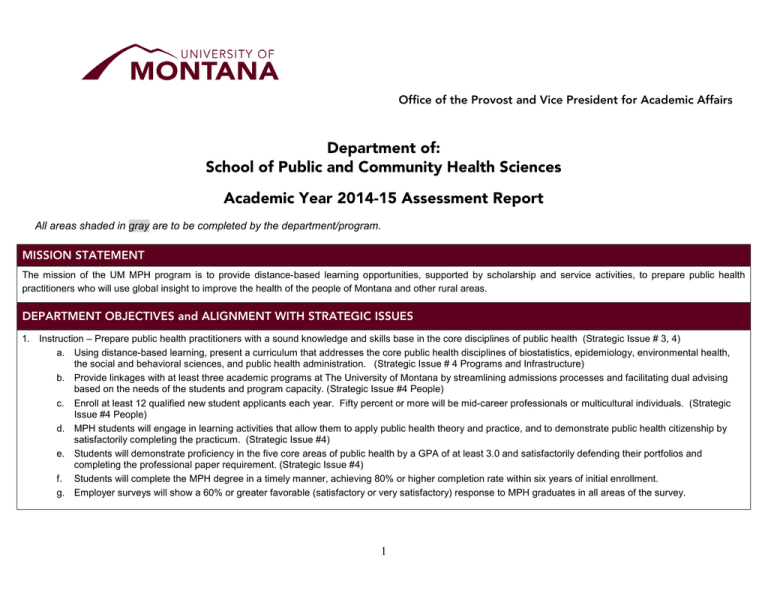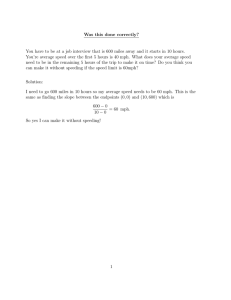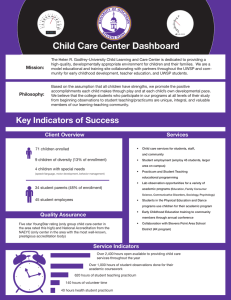Department of: School of Public and Community Health Sciences
advertisement

Office of the Provost and Vice President for Academic Affairs Department of: School of Public and Community Health Sciences Academic Year 2014-15 Assessment Report All areas shaded in gray are to be completed by the department/program. MISSION STATEMENT The mission of the UM MPH program is to provide distance-based learning opportunities, supported by scholarship and service activities, to prepare public health practitioners who will use global insight to improve the health of the people of Montana and other rural areas. DEPARTMENT OBJECTIVES and ALIGNMENT WITH STRATEGIC ISSUES 1. Instruction – Prepare public health practitioners with a sound knowledge and skills base in the core disciplines of public health (Strategic Issue # 3, 4) a. Using distance-based learning, present a curriculum that addresses the core public health disciplines of biostatistics, epidemiology, environmental health, the social and behavioral sciences, and public health administration. (Strategic Issue # 4 Programs and Infrastructure) b. Provide linkages with at least three academic programs at The University of Montana by streamlining admissions processes and facilitating dual advising based on the needs of the students and program capacity. (Strategic Issue #4 People) c. Enroll at least 12 qualified new student applicants each year. Fifty percent or more will be mid-career professionals or multicultural individuals. (Strategic Issue #4 People) d. MPH students will engage in learning activities that allow them to apply public health theory and practice, and to demonstrate public health citizenship by satisfactorily completing the practicum. (Strategic Issue #4) e. Students will demonstrate proficiency in the five core areas of public health by a GPA of at least 3.0 and satisfactorily defending their portfolios and completing the professional paper requirement. (Strategic Issue #4) f. Students will complete the MPH degree in a timely manner, achieving 80% or higher completion rate within six years of initial enrollment. g. Employer surveys will show a 60% or greater favorable (satisfactory or very satisfactory) response to MPH graduates in all areas of the survey. 1 2. Research – Conduct research relevant to faculty expertise that will foster an atmosphere of scholarship as our students learn public health science and practice and contribute to the enhancement of health in human populations (Strategic Issue # 2, 3, 4) a. Faculty will maintain productive research and scholarly activities in the public health sciences as defined by Unit Standards of the various academic units to which they belong. (Strategic Issue #3) b. Faculty will teach students to appreciate the value of public health research, scholarship and quantitative skills, and to use public health data effectively; faculty will also provide students with opportunities to conduct research. i. (Strategic Issue #2 - In collaboration with Mekelle University, a Public Health Practicum site was opened in Ethiopia; two students participated during the 2014 summer.) ii. (Strategic Issue #2 – In collaboration with Akros Global Health, a student Practicum based in Lusaka, Zambia was conducted during Fall 2014) iii. (Strategic Issue #3 - A faculty member received the Paul Lauren Undergraduate Research Faculty Mentor Award for research conducted with two students regarding the UM Tobacco Free Campus policy.) iv. (Strategic Issue #3 - Three public health faculty received research funding for a five year project working in rural and Native American communities regarding wood smoke/particulate matter exposure and reducing adverse respiratory outcomes.) v. (Strategic Issue #3 – Two public health faculty are involved in a five year NIGMS grant to put clinical research into practice to address regional health concerns, this grant features 13 universities in 7 states) c. Faculty will communicate the results of their research and scholarly activities both locally and nationally or internationally. i. (Strategic Issue #3 - A faculty member was an invited keynote speaker at Biostat 2014, the 21st International Scientific Symposium on Biometrics, Dubrovnik, Croatia. She spoke on Statistician Elizabeth L. Scott’s Advocacy Leadership for Social Change.) 3. Service - Provide service to help meet the public health needs of Montana, the intermountain west, and rural areas beyond through consultation, collaboration, and continuing education. (Strategic Issue # 3) a. Each year, all core faculty members will provide leadership, education, or technical service to organizations and individuals devoted to health and public health in our community. i. (Strategic Issue #3 - Three public health faculty received research funding for a five year project working in rural and Native American communities regarding wood smoke/particulate matter exposure and reducing adverse respiratory outcomes.) b. Faculty will provide students with opportunities to be involved in service and students will document their community service activities on their curriculum vita. (Strategic Issue #3) STUDENT LEARNING GOALS AND MEASUREMENT TOOLS University of Montana, MPH Program CEPH Certificate of Accreditation See Provost 05/08/14 program review attached See Faculty Senate 02/12/14 program review attached See Curriculum Map attached 2 RESULTS AND MODIFICATIONS 04. Practice public health with people from diverse populations Two international practicum opportunities was used. Two students conducted their practicums at Mekelle University in Ethiopia during the 2014 summer, and one student conducted her practicum in Lusaka, Zambia during the Fall 2014. Continue to seek more opportunities for students to interact with people from diverse populations. The MPH program goals stated in the 04/12/12 self-study to improve its recruitment and retention of minority student enrollment to match the ethnic profile of Montana of 6% American Indian and 3% students of color and/or Hispanic (not including American Indian) has been exceeded (9.3% and 7.8% respectively) during the fall 2014 semester. APPENDICES 1. University of Montana, MPH Program CEPH Certificate of Accreditation 2. Provost 05/08/14 program review 3. Faculty Senate 02/12/14 review 4. Curriculum Mapping FUTURE PLANS FOR CONTINUED ASSESSMENT To continue developing the program to align with national accreditation expectations from the Council on Education for Public Health. 3


